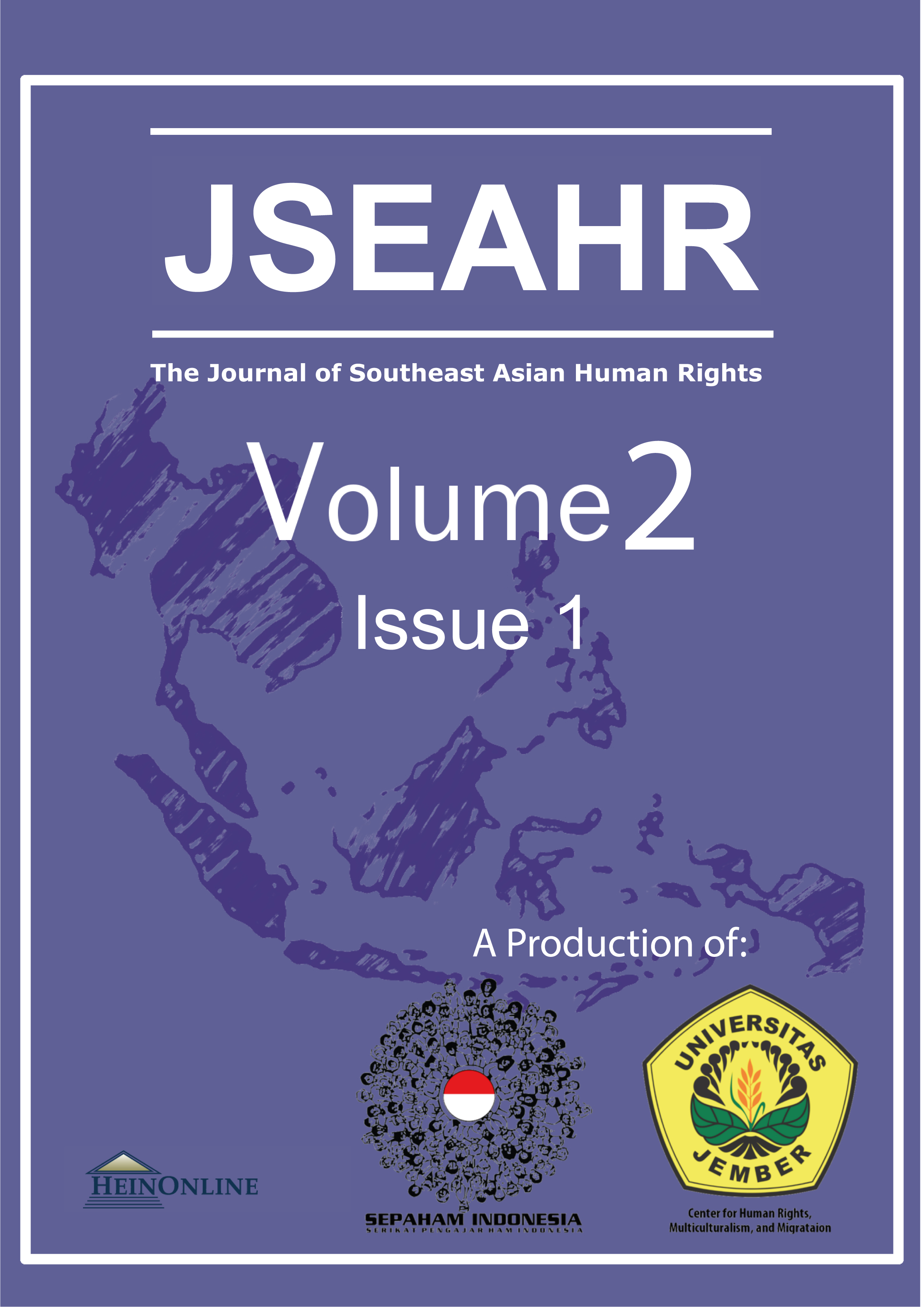Democracy through Election
A Study on the Conflict of Norms in Aceh’s Election Process
DOI:
https://doi.org/10.19184/jseahr.v2i1.5333Keywords:
Pre-Election, Dispute, Provincial Elections, Constitutional CourtAbstract
After amendment the 1945 Constitution, Indonesia has adopted election mechanism to implement a value of democracy. Unfortunately, the regulations as a main tool have not completely covered all of election issues. It follows that the election legal systems have only been prepared for the post-election dispute instead of the pre-election dispute. This case happened in the province of Aceh. On one hand Aceh has its own law regarding the autonomy province, on the other hands, Aceh must coexist the national law as well. However, both Aceh’s law and national’s law does not clearly provide the mechanism of handling the pre-election dispute among the regulations. This implies that the provincial election cannot be implemented as long as does not have legal certainty. In the provincial level have suggested making a new bylaw focusing on the local election only, nevertheless, central government have strongly rejected this idea.
Downloads
References
Armia, Muhammad Siddiq. “Constitutional Courts and Judicial Review: Lesson Learned For Indonesia†(2017) 8:1 J Negara Huk.
Asshiddiqie, Jimly. Hukum tata negara darurat (Rajawali Pers, 2007).
Baier, Matthias. Social and Legal Norms: Towards a Socio-legal Understanding of Normativity (London: Routledge, 2013).
Decree of The Constitutional Court of Republic of Indonesia (Putusan Mahkamah Konstitusi) No. 003/PUU/2005.
Decree of The Constitutional Court of Republic of Indonesia (Putusan Mahkamah Konstitusi) 35/PUU-VIII/2010.
Ekatjahjana, Widodo. “Menggagas Peradilan Partai Politik Dan Pemilu Dalam Sistem Ketatanegaraan Indonesia†(2009) 2:1 J Konstitusi.
Government Regulation Substituting a Law No. 2 of 2007 on Aceh and Nias Post-Tsunami Legal Settlement.
Gumay, Hadar et al. Laporan Kajian Undang-Undang Pemilu: Sebuah Rekomendasi Terhadap Revisi UU No. 10/2008 tentang Pemilu Anggota DPR, DPR Provinsi, Kabupaten/Kota dan DPD (Jakarta: CETRO, 2011).
International Crisis Group. Indonesia: Mencegah Kekerasan Dalam Pemilu Kepala Daerah Asia Report N°197 (Jakarta: International Crisis Group, 2010).
Khanif, Al. “Protecting the Rights of Religious Minorities in the Framework of International Human Rights Law and Islamic Law†(2013) 7:2 J Glob Strateg.
Law No. 3 of 2009 on the Second Amandment of Law No. 14 of 1985 on Supreme Court Article 31A (1) (Undang-Undang Nomor 3 Tahun 2009 Tentang Perubahan Kedua Atas Undang-Undang Nomor 14 Tahun 1985 Tentang Mahkamah Agung, Pasal 31A ayat [1]).
Law No. 9 of 2004 on the Second Amandment of Law No. 5 of 1986 on State Administrative Court Article 2 (Undang-Undang Nomor 9 Tahun 2004 Tentang Perubahan Atas Undang-Undang Nomor 5 Tahun 1986 Tentang Peradilan Tata Usaha Negara, Pasal.2.)
Law No. 11 of 2006 on Aceh Government (Undang-Undang Nomor 11 Tahun 2006 Tentang Pemerintahan Aceh).
Law No. 11 of 2011 on the Amandment of Law No. 24 of 2003 on Constitutional Court (Undang-Undang Nomor 11 Tahun 2011 Tentang Perubahan Atas Undang-Undang Nomor 24 Tahun 2003 Tentang Mahkamah Konstitusi).
Law No. 12 of 2011 on the Formation of Legislation Article 8 (1) (Undang-Undang Nomor 12 Tahun 2011 Pembentukan Peraturan Perundang-Undangan, Pasal.8 ayat (1)).
Law No. 24 of 2003 on Constitutional Court
Law No. 48 of 2007 on Aceh and Nias Post-Tsunami Legal Settlement (Undang-Undang Nomor 48 Tahun 2007 Tentang Penyelesaian Masalah Hukum Pasca Tsunami di Aceh dan Nias).
Menski, Werner F. “Human Rights in Southeast Asia†(2017) 1:2 J South East Asian Hum Rights 109.
Nkansah, Lydia. “Electoral Justice Under Ghana’s Fourth Republic†(2016) SSRN Electron J.
Omodia, S M. “The 2015 Kogi State Gubernatorial Election and the Crisis of Political Mandate: The Failure of Party Politics†(2016) 3:3 Adv Soc Sci Res J.
Sardini, Nur Hidayat. Restorasi penyelenggaraan pemilu di Indonesia (Fajar Media Press, 2011).
Siddiq, Muhammad. “Kegentingan Memaksa Atau Kepentingan Penguasa (Analisis Terhadap Pembentukan Peraturan Pemerintah Pengganti Undang-Undang (PERPPU))†(2014) 48:1, online: <http://asy-syirah.uin-suka.com/index.php/AS/article/view/87>.
Soebechi, Imam. Judicial review perda pajak dan retribusi daerah (Sinar Grafika, 2012).
Supreme Court of Republic of Indonesia (Mahkamah Agung Republik Indonesia), Decree No. 315 K/TUN/2008. Number 315 K/TUN/2008 on 22 October 2008 between General Election Commission against Partai Republik Indonesia.
Supreme Court of Republic of Indonesia (Mahkamah Agung Republik Indonesia), Surat Edaran Nomor 08A Tahun 2008 tentang Pengalihan wewenang Mengadili Sengketa Pemilukada. The adjudication of the Encyclical of the Supreme Court of Republic of Indonesia Number 08A of 2008 on the Switched Jurisdiction on the court of Provincial Election Dispute.
Supreme Court of Republic of Indonesia (Mahkamah Agung Republik Indonesia), Surat Edaran Nomor 7 Tahun 2010 Petunjuk Teknis Sengketa Mengenai Pemilihan Umum Kepala Daerah (PILKADA). Consequently, the Supreme Court established the Encyclical number 7 of 2010 on the Technical Guidance of the dispute of the Provincial Election.
Wicaksono, Dian Agung & Ola Anisa Ayutama. “Inisiasi Pengadilan Khusus Pemilihan Kepala Daerah Dalam Menghadapi Keserentakan Pemilihan Gubernur, Bupati, dan Walikota di Indonesia†(2015) 4:1 J RechtsVinding.
“Dana Distop, Tahapan Pilkada Tergangguâ€, (16 March 2012), online: <http://aceh.tribunnews.com/2011/11/10/dana-distop-tahapan-pilkada-terganggu>.
“Bawaslu Perlu Jadi Ajudikasiâ€, Sindo News (2 May 2012), online: <http://www.sindonews.com/ read/2012/01/27/435/564378/bawaslu-perlu-jadi-ajudikasi>.
Serambi Indonesia. “KIP: Pilkada Aceh Pakai Qanun Nomor 7/2006â€, (14 September 2011), online: Serambi Indones <http://aceh.tribunnews.com/2011/09/13/kip-pilkada-aceh-pakai-qanun-nomor-72006>.
———. “PA: Jangan Utak-atik UUPAâ€, (10 October 2011), online: Serambi Indones <http://aceh.tribunnews.com/2011/10/10/pa-jangan-utak-atik-uupa>.







